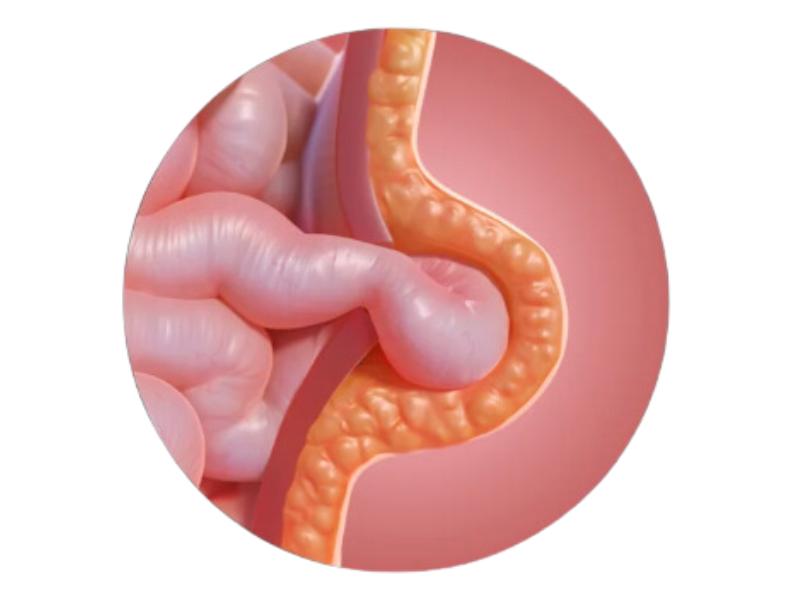A ventral hernia arises when abdominal tissues protrude through a weakened area in the abdominal wall muscle, forming a “hole.” These hernias can manifest anywhere on the abdomen, with risk factors including obesity, injuries, previous hernias, abdominal surgeries, pregnancy, or heavy lifting. If you face this condition, seek ventral hernia repair treatment in Bangalore, Jayanagar, which offers various options like open, laparoscopic, and robotic hernia repair. Our specialized medical team can provide comprehensive care and tailor the treatment to your unique needs, helping you regain your health and quality of life. Don’t delay, schedule a consultation today to explore the best treatment approach for your ventral hernia repair.

Types of Ventral Hernia
Ventral hernias are classified based on their location of formation:
1. Incisional hernia: This type occurs at the site of a previous surgical incision.
2. Epigastric hernia: Forming between the breastbone’s base and the belly button, this type occurs within the abdominal area.
3. Umbilical hernia: Found around the navel or belly button, this type of ventral hernia develops in that specific region.
Each type of ventral hernia requires proper diagnosis and appropriate treatment to effectively address the condition and prevent complications. If you suspect or have been diagnosed with a ventral hernia, seek prompt medical attention to receive specialized care and personalized treatment options tailored to your specific hernia type and medical needs. Early intervention can lead to a successful recovery and improved quality of life. Don’t hesitate to consult with our medical experts in Jayanagar, Bangalore, to explore the best course of action for your ventral hernia.
Diagnosis of Ventral Hernia:
Diagnosing ventral hernias involves various techniques, starting with a medical history and physical examination by a healthcare provider. The abdomen region is carefully assessed for potential hernia development. Subsequently, abdominal imaging tests like ultrasound, MRI, or CT scans may be conducted to identify evidence of a ventral hernia.
Preventing Ventral Hernia:
Certain actions and circumstances can lead to ventral hernias, but adopting preventive measures can significantly reduce the risk. Key prevention methods include:
- Maintaining a healthy body weight
- Avoiding heavy lifting without proper techniques
- Strengthening the core muscles
- Managing diabetes
- Quitting smoking
- Regular exercise to keep the body in good shape.
Surgical Ventral Hernia Repair Treatment and Post Treatment:
Ventral hernia surgery aims in ventral hernia repair in the abdominal wall gap and reposition protruding tissues and organs. The procedure chosen depends on the hernia’s severity, with two options available:
- Open ventral hernia repair: Typically used for larger and complex hernias, this surgery involves a single long incision near the hernia. In some cases, a mesh made of animal tissue or synthetic material is used to support the tissues.
- Laparoscopic ventral hernia repair: This approach utilizes a laparoscope with a camera to guide the surgeon. Three to four small incisions are made near the hernia, and a mesh may be used to stabilize the tissues. Laparoscopic repair is a minimally invasive technique, resulting in smaller incisions, shorter operating time, and quicker recovery. Following surgery, patients should follow their doctor’s post-treatment care instructions to ensure a successful recovery and minimize complications.
Recovery varies for each patient, based on the surgery type and their overall health. Pain levels differ; some experience minimal discomfort after open repair, while others may feel more pain, even with a laparoscopic procedure.
Hospital stays may be required, depending on the surgery’s extent; laparoscopic patients often go home the same day. Normal activities can resume in two to four weeks, but vigorous exercise should wait for at least six weeks. Following post-operative guidelines is crucial for a successful recovery and optimal outcomes.
Why Choose Dr.Rajeev Premnath for Ventral Hernia Repair or Treatment ?
Ventral hernias do not resolve spontaneously and necessitate surgical repair. If left untreated, they can worsen and increase in size over time. Dr.Rajeev Premnath offer two specific methods for ventral hernia repair: open surgery and laparoscopic surgery.
To ensure the best treatment and avoid complications our experienced specialists perform highly advanced surgeries. Don’t ignore symptoms; consult our ventral hernia surgeons or book an appointment with us promptly.
With a commitment to innovation, we offer personalized care and advanced surgical solutions. Our ventral hernia surgeons Dr.Rajeev Premnath share his knowledge through national and international presentations and web-based seminars, educating physicians on innovative techniques.
